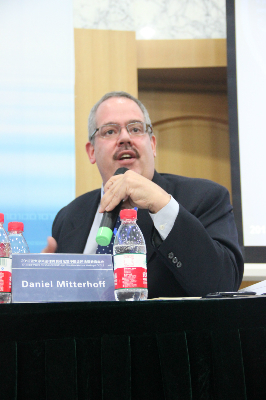
Message from the President
Cambodia - Guangxi - Laos - Myanmar - Thailand - Vietnam - YunnanDaniel J. Mitterhoff
President,
China-Mekong Law Center
Why The Mekong Region?
The term “Greater-Mekong Subregion” (GMS) is a geographic-cum-economic concept first articulated by the Asian Development Bank in the 1980s. Consisting of two Chinese provinces–Yunnan Province and Guangxi Zhuang Autonomous Region and the five countries of mainland Southeast Asia–Cambodia, Laos, Myanmar, Thailand and Vietnam–the GMS is now considered an area of integrated development following broadly along the spine of the mighty Mekong river, which originates on the Tibetan plateau, traverses nearly 3000 miles across Southwest China (where it is known as the Lancang River) and through the heart of mainland Southeast Asia, emptying into the South China Sea via the Mekong Delta in southern Vietnam.

SThe GMS is a region of enormous anthropological and environmental diversity. With a total population of around 325 million people, a portion of which are ethnic minorities whose communities often straddle national borders, inclusive development remains an imperative. The area is also one of amazing richness of flora and fauna (fish diversity is second only to the Amazon river basin), the preservation of which is important not only as global heritage, but also because the livelihood of so many depends on the region’s ecological health.
Despite its huge economic potential, the GMS is extremely fragile, both socially and environmentally, plagued by an array of problems including, but not limited to, stateless persons; illegal drug trade and drug addiction; war and refugees; trafficking in persons; cross-border criminal enterprise; unequal access to social services and credit; exploitation of migrant labor; environmental degradation (over-fishing, over-logging and pollution); insufficient public participation in development decisions; disputes over water-use rights; and unremedied injustice. In parts of the GMS, there remains a dearth of political and judicial infrastructure to manage the resolution of disputes and dampen broader social tensions, further limiting regional potential.
Where We Have Been
For over 25 years, China-Mekong Law Center has been instrumental in leading or facilitating legal education reforms in China and mainland Southeast Asia (see Our History page). During this time, we proudly assisted various Asian law schools to adopt new courses, establish unique academic programs and improve overall pedagogy. In turn, numerous law students have gained immensely from participation in CMLC supported programs, including scholarship support to continue studies both domestically and overseas. CMLC supported students now fill professional ranks throughout China, Europe, Southeast Asia and the USA. CMLC also proudly trumpets the many institutional partnerships– formal cooperation between and among law schools– that we have facilitated over the years.
But global conditions have changed substantially and CMLC must adjust. As international academic cooperation has waned in China, and come to an abrupt halt with the military coup in Myanmar, CMLC unfortunately had to take the axe to many or our initiatives, relegating past successes to Our History page. CMLC now finds itself focused on building less widely, but more deeply, under its primary partnership with the Faculty of Interdisciplinary Studies, Khon Kaen University, Nongkhai Campus Thailand (IS-KKU). Setbacks give rise to new opportunities.
Where We Are Going
We continue to believe that well-written laws, stronger legal institutions and competent ethical lawyers can make a positive difference in the sustainable development of the GMS. This is why we have dedicated ourselves to training professionals to serve the needs of disadvantaged communities in the GMS. Our mission now coalesces around the establishment of a formal M.A. Degree Program in Mekong Region Law and Development in partnership with IS-KKU. This degree program, if approved by Khon Kaen University, will proceed under the rubric of the Mekong Region Legal Studies Program already established at IS-KKU through CMLC cooperation with a predecessor faculty. Related initiatives include maintenance and expansion of a Consortium of Mekong Region Law Schools, as well as Scholarship Support for students to study law at IS-KKU, all in the service of strengthening and diversifying graduate legal studies for students from, or interested in, the Greater Mekong Subregion.
CMLC’s formula is to gather students from throughout the GMS into the same classroom for joint exploration of the laws and legal systems of mainland Southeast Asia, focusing on legal problems/solutions associated with development challenges in the GMS. We truly believe that graduate level students– by sharing regional perspectives under the guidance of professors studied not only in their respective subject expertise, but the broader issues confronting the GMS– can ultimately emerge as a cadre of lawyers and other professionals who understand the law, comparatively and internationally, and the “Mekong,” its peoples and its problems, possessing the skills to solve/mitigate these problems for the betterment of the entire region. We expect that these future professionals will represent vulnerable and disadvantaged stakeholders in the GMS, all with a deep commitment to the healthy, sustainable, fair and just development of the region.
The Past is Prologue
The prospective M.A. Degree Program in Mekong Region Law and Development will be the culmination of years of effort. From January-May 2016, China-Mekong Law Center launched a semester pilot of the Mekong Region Legal Studies Program bringing two students from China, two students from Myanmar, two students from Thailand and two students from Vietnam into the same classroom for study together in four intensive law courses: 1) Comparative Study of Mekong Region Legal Systems; 2) Introduction to the Chinese Legal System; 3) Comparative Government Procurement Law; and 4) Project Design and Writing Grant Proposals. A second pilot of identical courses attended by fifteen students representing all GMS countries followed in August-December 2018.
China-Mekong Law Center is deeply pleased by the dynamic learning environment created in the Mekong Region Legal Studies Program and quite honored by the students’ praise of not only course quality, but also the international community created by the coming together of students from throughout the region. This cohort of regional lawyers remains in close contact and represents merely the start of China-Mekong Law Center’s efforts to build bridges among professionals in the Greater Mekong Subregion with the goal of fostering mutual understanding, enhancing cross-border professional networks, and developing shared solutions to common problems impacting the region.
In 2019, CMLC was instrumental in obtaining a grant award from the International Center for Not-For-Profit Law to create a fifth course, 5) Civil Society Organizations and Public Participation in Development. Hence, comprehensive course designs for half the curriculum for the prospective M.A. Degree in Mekong Region Law and Development are now complete. Since then, with the impact of the Covid-19 pandemic and restructuring at Khon Kaen University, progress slowed but never abated and we are on the cusp of a formal application to Khon Kaen University for curriculum/degree approval. Consequently, CMLC is very close to its dream of establishing a special English-language Masters-level degree program focused on law in the development processes of GMS countries; a program open to all students interested in helping disadvantaged individuals and communities navigate the complex regional development process. This unique degree program will equip students with the necessary knowledge and problem solving skills to make a difference in the lives of underserved individuals and communities in the GMS. A full list of proposed course offerings with descriptions can be found here.
The establishment of an M.A. Degree in Mekong Region Law and Development offers a unique opportunity to cultivate well-trained lawyers, legal advisors and development professionals to serve vulnerable and disadvantaged populations in a rapidly changing environment. While the pace of change in the GMS will remain robust, CMLC simply endeavors to ensure that such growth remains sustainable, fair, just and reasonable for the need of the peoples of the GMS. Please support us by clicking on the Donate link below and making a financial contribution towards the success of this important initiative. Thank you.
